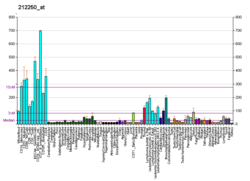Top Qs
Timeline
Chat
Perspective
MTDH
Protein-coding gene in the species Homo sapiens From Wikipedia, the free encyclopedia
Remove ads
Metadherin, also known as protein LYRIC or astrocyte elevated gene-1 protein (AEG-1) is a protein that in humans is encoded by the MTDH gene.[5][6][7]
Remove ads
Remove ads
Function
MTDH (AEG-1) is involved in HIF-1alpha mediated angiogenesis. MTDH also interacts with SND1 and involved in RNA-induced silencing complex (RISC) and plays very important role in RISC and miRNA functions.[8][9] MTDH has been shown to interact with spliceosome proteins in the cell nucleus and regulate the process of alternative splicing.[10]
MTDH induces an oncogene called Late SV40 factor (LSF/TFCP2) which is involved in thymidylate synthase (TS) induction and DNA biosynthesis synthesis.[11] Late SV40 factor (LSF/TFCP2) enhances angiogenesis by transcriptionally up-regulating matrix metalloproteinase-9 (MMP9).[12]
Remove ads
Clinical significance
Summarize
Perspective
MTDH acts as an oncogene in melanoma, malignant glioma, breast cancer and hepatocellular carcinoma.[13] It is highly expressed in these cancers and helps in their progression and development. It is induced by c-Myc oncogene and plays an important role in anchorage independent growth of cancer cells (metastasis).
Elevated expression of MTDH, which is overexpressed in more than 40% of breast cancers, is associated with poor clinical outcomes. MTDH has a dual role in promoting metastatic seeding and enhancing chemoresistance. MTDH is therefore a potential therapeutic target for enhancing chemotherapy and reducing metastasis.[14][15][16][17]
MTDH has been shown to be overexpressed in prostate cancer, where there is a shift towards a more cytoplasmic localisation, signalling a poor prognosis.[18][19] In the nucleus of prostate cancer cells, MTDH has been shown to affect alternative splicing of genes such as CD44, which may also be associated with prostate cancer progression.[10]
LSF/TFCP2 plays a multifaceted role in chemo resistance, EMT, allergic response, inflammation and Alzheimer's disease.[20]
MTDH controls many hallmarks of oncogenes and cancer. MTDH/AEG-1 induces hepato steatosis in mouse liver.[21] MTDH knockdown by artificial microRNA interference functions as a potential tumor suppressor in breast cancer.[22] Astrocyte elevated gene-1/MTDH undergoes palmitoylation in normal and abnormal cell physiology.[23] Biomaterial titanium substrata with microgrooves can alter MTDH expression in human primary cells.[24]
Remove ads
Interactions
MTDH has been shown to interact with:
- NF-kB-p65 subunit, [26]
References
Further reading
Wikiwand - on
Seamless Wikipedia browsing. On steroids.
Remove ads






